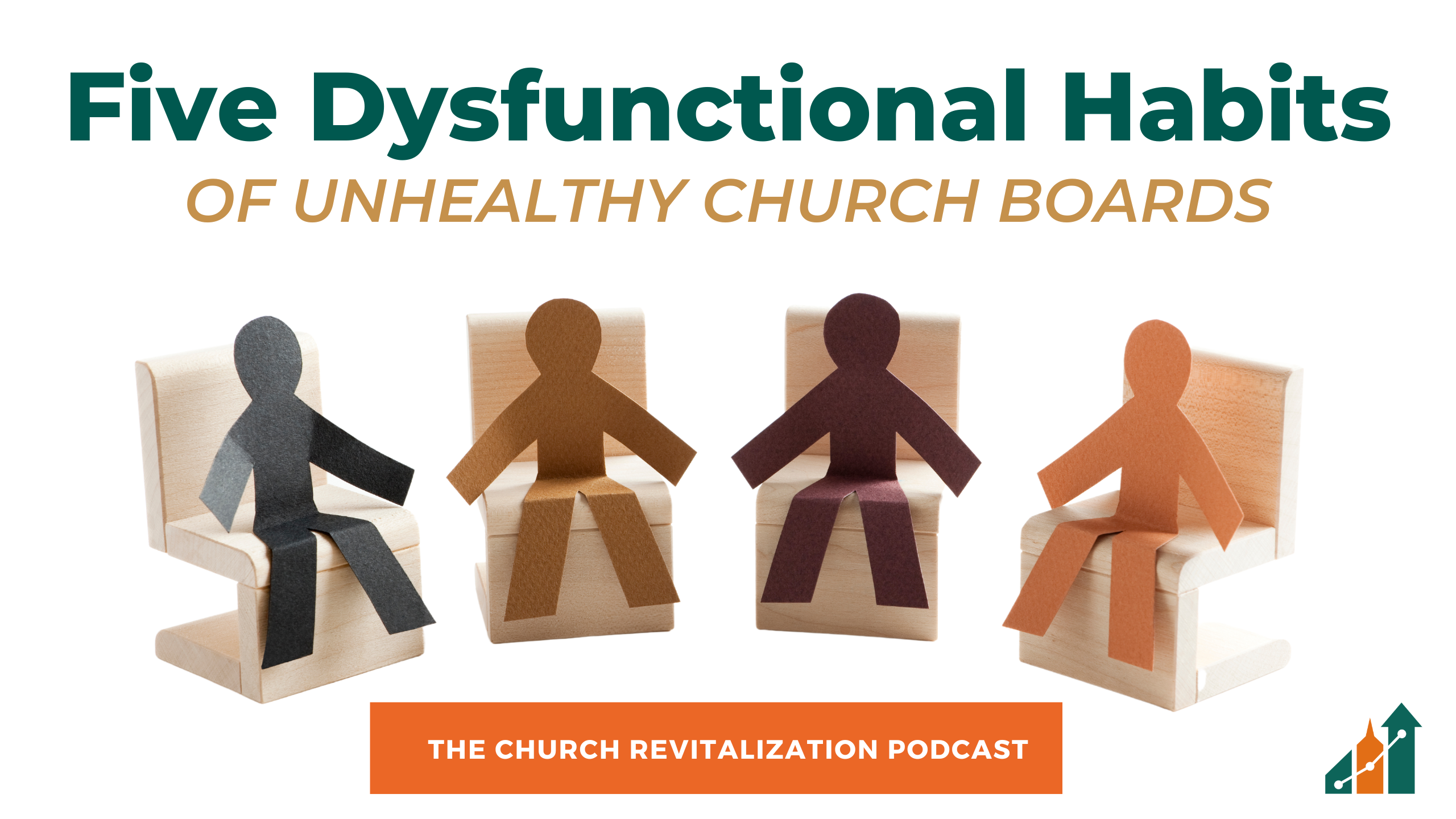The Church Revitalization Podcast – Episode 157
The church rises and falls on the quality of leadership at the top.
A large number of churches I’ve worked with over the years have been congregationally-led. They have myriad committees–finance, personnel, the nomination committee, and the committee on committees (which I can’t ever seem to distinguish in purpose from the nomination committee!).
Yet in the face of all this bureaucracy and inefficiency, when I propose the idea of a senior-level church board that has more authority to make decisions, the number one criticism I hear is, “Church boards are the death of a church!”
Truthfully, the committee-driven, congregationally-led church is like death by a thousand cuts. A bad church board is more like a single bullet to the heart. Bad leadership kills churches, not the polity model. The question really is: which approach to leadership is more biblically faithful and has more upside.
In 1 Timothy and Acts 6, the Bible outlines a model for leadership that includes the role of elders (also called pastors or overseers) and deacons (or servants, what we might call “volunteers” in modern parlance). The senior leaders (the apostles, the prophets, the evangelists, the pastors and teachers mentioned in Ephesians 4:11) equip all the saints for the work of ministry.
It’s our conviction, therefore, that a team or board of qualified senior leaders is an essential component of a healthy church leadership culture. Regardless of the number of staff, volunteer teams, or committees that may exist in a given church, we believe that a Biblically healthy church includes a senior leadership team that is accountable for the mission and faithfulness of the congregation. Sometimes these teams are called elders–but sometimes they’re called a consistory, session, church council, or executive leadership team. In our view, the function and qualification of the leaders matters more than the terminology.
That said, when church boards are dysfunctional, they can kill the momentum of a church. They can do more to single-handedly run a church into the ground than just about any other factor.
In our work with various churches, we’ve been able to identify consistent patterns of dysfunctional habits. Here, we outline the five most common dysfunctional habits of unhealthy church boards.
Subscribe below to never miss an episode.
Spends time on trivial agenda items
Far and away the most consistent bad habit of unhealthy church boards is the tendency to waste time on topics they have no business addressing. Of course, triviality is relative. Choosing a paint color for the youth room isn’t trivial to the painter! But selecting paint ought to be trivial to the church board.
Admittedly, it can be difficult to sort through all of the potential business items a board might feel is important to tackle. Here are a few practical tips to help you decide what’s worth your time.
First, ask, “If our church board could only make five decisions this year, would we spend one on this issue?” If the answer is immediately and resoundingly, “NO!” then the topic is not worth your time. If it’s still unclear, ask, “Does this issue impact at least 50% of the congregation?” If the answer is “no” then it also is likely not worth a lot of your attention. Finally, ask, “Does this issue obviously and demonstrably affect the vision or spiritual health of the church?” If the answer is “no,” delegate the issue to staff or other volunteer teams.
A good chairperson should be effective in sorting through issues before a meeting and setting an agenda that only includes the most important topics. Work in conjunction with the Senior Pastor to help set this agenda.
Has unclear board expectations
A deeper, more foundational problem is that dysfunctional church boards often haven’t determined what the role and function of a board member is. What is the purpose of the board? What does a healthy board member look like? How do they spend their time? How are they held accountable?
I’m often astounded at the number of churches that do not have job/position description for their board members. Therefore, whenever a new board member joins the team, they fill in the blanks with their own assumptions. This is an obvious recipe for disaster.
While your constitution or bylaws likely give some direction as to the role and function of a board member, this picture is usually incomplete. Be sure that your onboarding process includes clear direction for what success looks like for a board member. We recommend getting a copy of Leading Leaders by Aubrey Malphurs, which includes extensive details on board functions as well as multiple examples, samples, templates, and tools in the appendix to help you get your board running in a healthy direction.
Elevates low-capacity strategic thinkers
Church boards have a bad habit of elevating “good people” onto boards with good intentions, but disastrous results. Longevity, seniority, and even good character are not the only necessary qualifications for a successful board member. To be certain, high character is essential for board members (or it should be!). But character alone is not the barometer for leadership.
In our Leadership Pipeline training, we emphasize the importance of assessing a leader’s character and capacity before elevativing him to certain positions in the church. A quality board member ought to be able to think strategically about the future, solve problems, and be able to make decisions in light of the future and not just the urgent. This kind of discernment and wisdom is uncommon. Therefore, not just anyone in your church is likely qualified to serve as a board member–only those with a track record of high character and high capacity.
Does not to follow-through
Let’s be honest with each other. Planning is fun. But execution is, well, a lot less fun! Church boards love a good retreat where ideas are put on easel pads. If anyone can relate, it’s us. We lead Strategic Envisioning workshops for a living. But it’s because we’ve been down this road enough times that we understand that the difference between healthy churches and unfruitful ones isn’t the quality of plans or ideas–it’s the commitment to execution.
This is one of the reasons why we always include a year of monthly implementation coaching when we work with churches. We want to help bridge the gap between inaction and action by providing support and accountability. But at the end of the day, your church–especially the church board–has to have a bias for action.
Plans are likely to change over time. We know that when we lead a strategic planning workshop, at least 30% of the ideas we outline are going to shift dramatically in the execution phase. This isn’t a sign a failure–it’s a sign of success! You can (and should) steer a moving car. The parked car might have a route plugged into the GPS, but will never arrive at the destination (potential detours and all) unless you put the car in drive.
Unhealthy church boards have the dysfunctional habit of letting ideas die on the vine due to a lack of execution. Make a commitment to end every meeting with clear action items, owners for those action items, and deliverables. Then, hold those owners accountable for their work. If they fail to do what they said they’d do, there ought to be consequences.
Of course, these consequences are generally more social and a sense of disappointment from the team. But if board members don’t sense that they have actually let anyone down by failing to follow through on their action items, there’s a disincentive to execute.
Fails to establish clear lines of authority
Similar to the bad habit of having unclear board expectations, a lack of lines of authority is usually a foundational failure to establish clear policies and procedures in the first place. Those of us who like to view rules as things that are meant to be broken, the thought of having a set of policies and procedures to establish lines of authority makes us queasy. I get it.
But the reality is that boundaries are good. Only when we know what the boundaries are can we thrive.
Imagine a situation where no one knows who is responsible for hiring a senior staff position. Does the Senior Pastor have the authority to hire the position? Personnel team? Does the church board have to sign off on the hire? What about the congregation?
You might know the answer when it comes to hiring in your church. But on less concrete issues, do you know who has the authority to make decisions? Too often, the answer is no. As a result, the world’s worst game of “kick the can” happens in a lot of churches, and nothing happens. Or, worse, someone just decides unilaterally to make the decision and pull the “better to ask forgiveness than permission” tactic.
Your church needs policies that clearly delineate lines of authority so that every leader, from the greeter to the church board member, knows exactly what decisions he is empowered to make, or who is empowered if it isn’t him.
These five bad habits are far from an exhaustive list, but they are the most common. Take a look at these dysfunctional habits. Which ones are guilty of creeping into your team? What action are you going to take to fix it?
If you need help aligning your board for success, send us an email or contact one of our Certified Guides.
BONUS: Watch this episode on YouTube.


Scott Ball is the Vice President and a Lead Guide with The Malphurs Group. He lives in East Tennessee with his wife and two children. (Email Scott).

